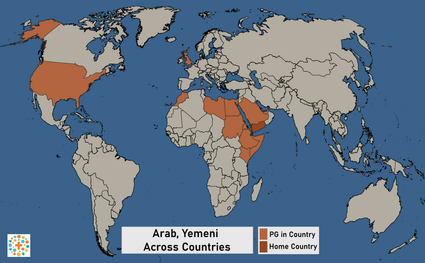The Arabs from the Arabian Peninsula are the original Arabs. Tribes of nomads from the Arabian Desert developed Arab culture. From there, they expanded into what we now know as the Arab World, where Arabic is the key language.
Yemenis started migrating north during the pre-Islamic era. Many Arab families with common names (e.g., Haddad, Haddadeen, which means Smith or metalworker) that have long family trees in Syria, Lebanon, Palestine and Jordan trace their ancestry to that early migration from Yemen. For example, the family name, Haddadeen, originated in Sana'a.
There are many Arabic dialects spoken in Yemen. Today, there is a sharp division between Yemeni from the northern tribes and the southern ones. Those from the north descended from Mesopotamians, who entered their land 1,000 years before Christ. They claim Ismail from the Book of Genesis, and their patriarch. Those from the south believe they descended from Qahtan, also known as Joktan, in the Bible.
Yemen and Egypt are part of a corridor of trade that has lasted for centuries. Therefore, there have been Yemenis in that country during this entire time. The Yemeni Arabs population in Egypt grew in 1962 because of policies established by Egyptian president, Gamal Abdel Nasser, who favored a pan-Arab foreign policy.
The north and the south of Yemen were separate nations in the 70s and 80s; one backed by communists and the other by the West. They merged for a couple of years, but now they are fighting once again. Iran backs one side using Shia Islam as their banner, while the other supports a Sunni Muslim head of state. Yemenis would love to have the fighting stop, but the situation is out of their control.
The war is driving people out of Yemen, and there is a large Yemeni diaspora, especially in Arabic speaking countries including Egypt.
Yemeni Arabs in diaspora try to maintain whatever occupation they had when they lived in Yemen. They have to re-establish new roots while dealing with the trauma of war. Many struggle to find employment in Egypt. Any refugee group, including Yemeni Arabs, must go through a difficult maze of red tape to work in the formal economy. Some work for Yemeni-run restaurants and shops, but most must settle for the informal jobs such as being day laborers. Some Yemeni women have made their own jobs by producing and selling baked goods and crafts.
It is challenging for Yemenis to keep their children in Egyptian schools, especially if they must be held back a grade because of the war in Yemen. Yemeni war refugees are less likely to be settled in Egypt as those from Syria or Sudan.
There are also members of the Yemeni political elites who live in Cairo, Egypt. Sometimes they enter with a medical visa, then manage to stay longer. Though this situation has accelerated since the renewed fighting in Yemen, there have been Yemenis who have entered through medical visas for over 60 years. Since they have money, they can have their children attend the best Egyptian schools and universities, and once these children graduate they can go to Europe or the U.S. to begin their careers. Some of the political elite develop their businesses in Egypt in real estate or high end restaurants, and they stop their involvement with politics. Others use their time and influence to further the cause of their political faction through fund raising and influencing interested foreign groups.
Yemeni Arabs have had a close association with Islam since it began in the 600s. Today, nearly all the Yemeni Arabs are Muslim, no matter where they live. Two-thirds of Yemenis adhere to some form of Sunni Islam, and about one-third are Shia Muslims. Though they vary in terms of tribal loyalty, one thing Yemeni Arabs all agree on is devotion to the Islamic religious system. Almost none of them have put their trust in Jesus Christ, no matter where they live.
Yemeni Arabs in diaspora need peace in their homeland. All of them have family members whose lives are in jeopardy because of the fighting. There will be no end to the fighting until there is humble repentance, and the acknowledgement that they must submit to the sin-free Savior. They need the intervention of Jesus Christ.
Pray for a lasting and just peace in Yemen that will allow the Yemeni diaspora to return home.
Pray for an end to foreign military intervention and blockades in Yemen.
Pray for the Lord to use the instability in Yemen to help Muslim Yemenis to understand they need a Savior.
Pray for the small number of Yemeni believers to boldly proclaim the gospel to their families, friends and neighbors.
Pray for small, extended-family based home fellowships to multiply in Egypt.
Scripture Prayers for the Arab, Yemeni in Egypt.
https://sanaacenter.org/publications/main-publications/12286
https://sanaacenter.org/publications/analysis/18228
| Profile Source: Joshua Project |


























